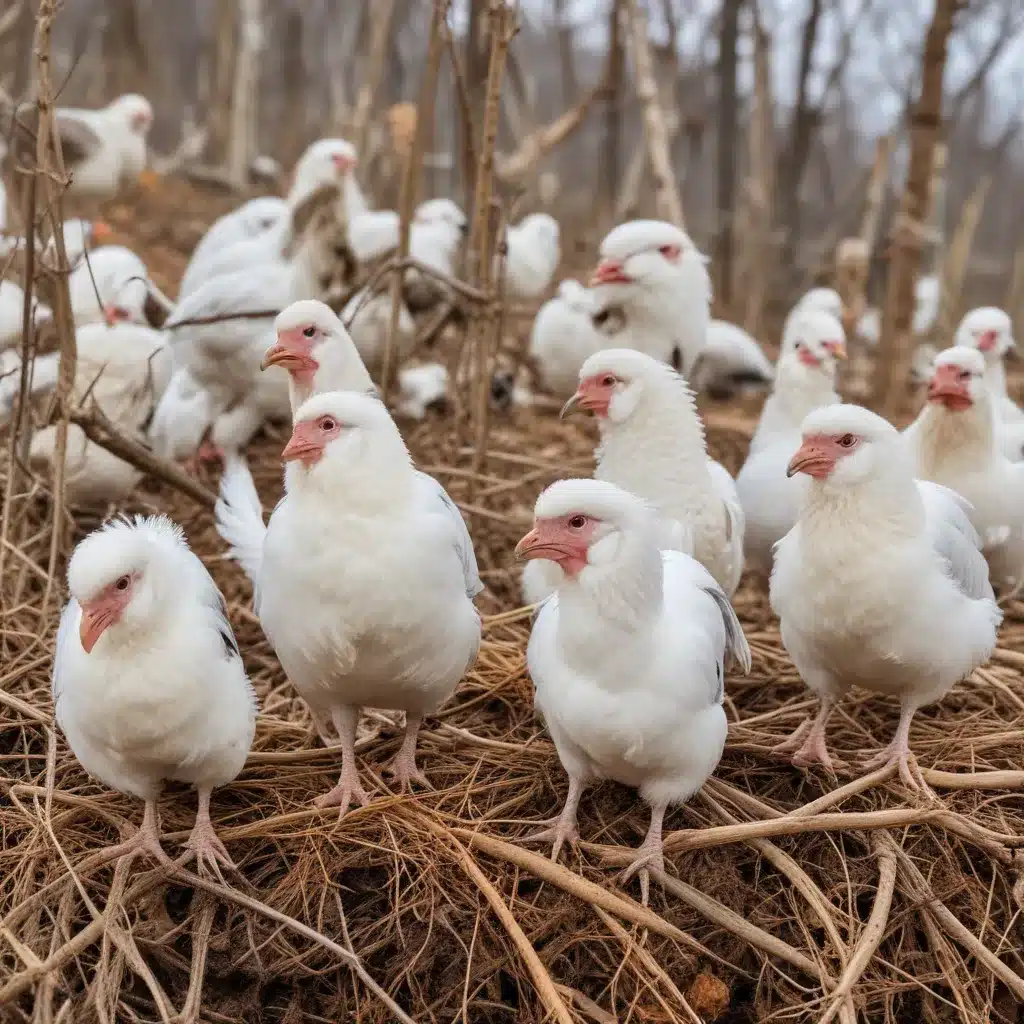
As an experienced avian caretaker, I’ve had the privilege of working with a wide variety of bird species over the years. One of the most rewarding aspects of this role is helping pet owners and backyard flock enthusiasts nurture the natural behaviors of their feathered companions. When it comes to feeding and foraging, there’s a wealth of enrichment strategies that can stimulate your birds’ instinctual drives and promote their overall well-being.
Avian Foraging Behavior
Feathered Foragers
Chickens, in their natural wild state, exhibit a rich tapestry of behaviors that are essential for their survival and well-being. From foraging for food to dust bathing, scratching the ground, and perching in trees, these activities are crucial for their physical health and mental stimulation. However, in captivity, the opportunities to express these natural behaviors can be significantly limited, leading to signs of boredom and stress.
Natural Feeding Habits
In the wild, chickens are skilled foragers, constantly on the search for a diverse array of nutritious foods. They may scratch the ground to uncover insects, seeds, and other small prey, while also exploring their surroundings for leaves, berries, and other plant matter. This constant engagement with their environment not only provides essential nutrients but also satisfies their innate need to explore and discover.
Enrichment Strategies
By understanding and addressing the behavioral needs of our feathered friends, we can significantly improve their overall well-being and quality of life. Through various enrichment strategies, we can create a stimulating and dynamic environment that encourages natural foraging behaviors, reduces stress, and promotes physical and mental health.
Backyard Poultry Flock Management
Flock Composition and Dynamics
When it comes to managing a backyard poultry flock, it’s important to consider the social dynamics and individual needs of each bird. Chickens are highly social creatures, and fostering positive interactions within the flock can have a profound impact on their well-being. By understanding the unique personalities and roles within the group, you can tailor your enrichment strategies to cater to the specific needs of your flock.
Habitat and Environmental Considerations
Creating an enriched environment is crucial for supporting the natural behaviors of your chickens. This involves incorporating diverse elements into their living space, such as varied terrain, dust baths, scratching areas, and safe hiding spots. By replicating the complexity of their natural habitats, you can encourage your birds to engage in a wide range of activities and reduce the risk of boredom and stress.
Feeding Supplements and Substrates
Providing a balanced and varied diet is essential for the health and well-being of your backyard flock. In addition to a high-quality commercial feed, incorporating supplemental foods and foraging opportunities can significantly enhance the feeding experience for your birds. Scattering grains, seeds, or insects throughout the enclosure can mimic the natural foraging behavior, while offering puzzle feeders and treat dispensers can stimulate their problem-solving skills.
Stimulating Natural Behaviors
Foraging Opportunities
Encouraging natural foraging behaviors is a cornerstone of avian enrichment. By creating designated areas within the coop or run where your chickens can scratch, peck, and explore, you can tap into their instinctual drives and provide mental stimulation. Incorporating a diverse range of substrates, such as sand, soil, wood chips, and leaf litter, can further enhance the foraging experience and encourage your birds to engage in their natural behaviors.
Instinctual Scratching and Pecking
Chickens have a strong instinct to scratch the ground and peck at their surroundings. Providing dedicated areas with loose, dry substrate can satisfy this need and allow your birds to engage in their natural behaviors. Additionally, incorporating objects that can be pecked, such as hanging toys or blocks, can stimulate their curiosity and keep them mentally engaged.
Hiding and Nesting Requirements
Creating safe and secure hiding spots and nesting areas is crucial for the well-being of your backyard flock. Chickens thrive in environments where they can retreat, rest, and feel protected. By offering various shelters, such as coops, perches, and even simple structures like wooden crates or barrels, you can provide your birds with the sense of security they crave and encourage natural nesting behaviors.
Promoting Avian Health and Welfare
Stress Reduction Techniques
Minimizing stress is a key aspect of promoting the overall health and well-being of your chickens. By incorporating sensory enrichment, such as visual, auditory, and olfactory stimuli, you can create a more dynamic and engaging environment that helps alleviate boredom and reduce anxiety. Additionally, positive interactions with their caregiver and opportunities for social exploration can contribute to a calmer, more content flock.
Nutritional Needs and Balancing Diet
Ensuring a balanced and varied diet is crucial for the health and vitality of your backyard flock. In addition to a high-quality commercial feed, incorporating supplemental foods and treats can provide essential nutrients and stimulate your birds’ natural foraging behaviors. By offering a diverse array of fruits, vegetables, grains, and protein-rich items, you can cater to their diverse nutritional needs and keep them engaged and interested in their meals.
Monitoring and Observing Flock
Regularly observing and monitoring your backyard flock is key to understanding their individual and collective needs. By documenting behavioral changes, tracking their response to enrichment activities, and consulting with avian veterinarians or experienced caretakers, you can make informed decisions about adjusting your strategies to ensure the continued well-being of your feathered friends.
At Mika Birds Farm, we believe that providing a stimulating and enriched environment for your backyard flock is essential for their physical and mental well-being. By incorporating a variety of foraging opportunities, sensory experiences, and social interactions, you can help your chickens thrive and engage in their natural behaviors. Remember, every flock is unique, so be prepared to experiment, observe, and adapt your enrichment strategies to suit the specific needs of your feathered family. With a little creativity and a deep understanding of avian behavior, you can create a truly rewarding and enriching experience for your backyard chickens. For more information and expert advice, be sure to visit our website at mikabirdsfarm.com.


